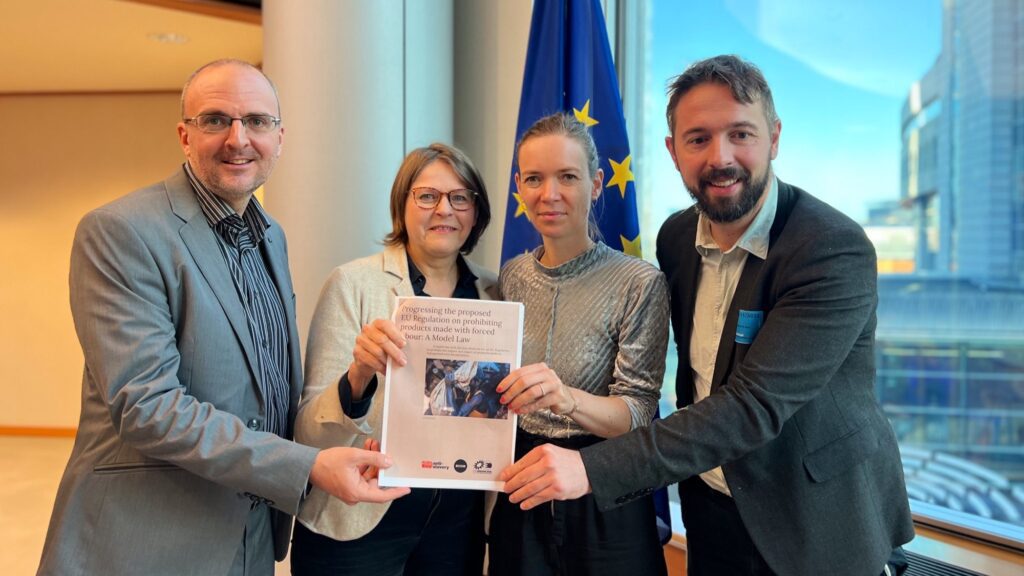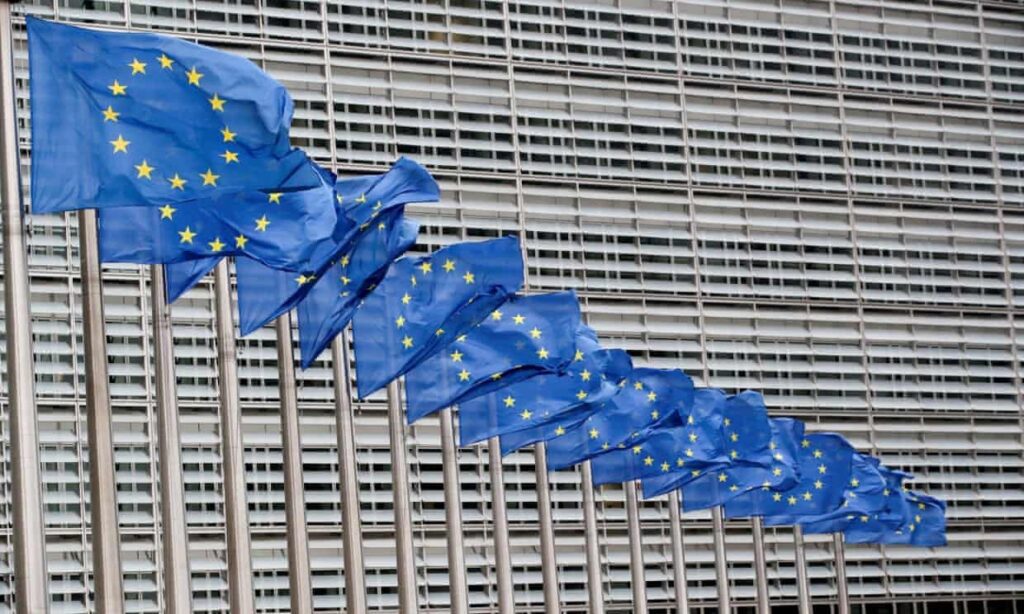16th March 2024: The Guardian – EU approves watered-down human rights and supply chain law
Revised corporate sustainability directive, first agreed in December, draws criticism from environmental campaigners. According to the EU watered-down human rights and supply chain law, EU countries have slashed the scope of a law which makes companies hunt down human rights abuse and environmental harm in their supply chains.
Original Source: The Guardian by Ajit Niranjan – 16th March 2024
The EU’s corporate sustainability directive, which was agreed in December but nearly scuttled after a minor coalition partner in the German government withdrew its support, was approved by member states on Friday after a month-long search for compromise and further lobbying from France and Italy.
Lara Wolters, a Dutch MEP with the centre-left Progressive Alliance of Socialists and Democrats (S&D) grouping who led negotiations for the European parliament, said the new law would help “stop businesses from looking away from very real human misery and destruction” but criticised member states who “persistently delayed” the adoption of the agreement.
The Belgian government, which holds the rotating presidency of the EU Council, thrashed out a compromise that limits the number of companies expected to comply. The new agreement applies to companies with more than 1,000 employees, up from 500, and a net turnover of €450m (£385m) – triple the amount previously agreed.
Environmental groups estimate the changes will exclude 70% of the companies the law was meant to cover.
EU governments have “killed two-thirds of the law” and the impact that it could have had, said Uku Lilleväli, a sustainable finance policy officer at WWF. “The EU countries endorsed the much-needed due diligence law, but at what cost? We’re left with bare bones, with an already weak framework that now covers only a fraction of all large companies.”
The rules, which must be voted on in the European parliament before they come into force, provide a framework for communities to sue EU companies for human rights abuses and environmental harm in their supply chains.
But efforts to water down the rules mean fewer companies will have to set targets to cut pollution and adopt climate transition plans than previously agreed and will have more time to comply. Member states also gutted a provision that would force companies to offer managers financial incentives to hit climate goals.
Aurélie Skrobik, a corporate accountability campaigner at Global Witness, said it was an affront by national governments but a relief that there was a law at all. “This law is a shadow of what it should have been – and what negotiators agreed in December.”
Opponents of the law argued it would place too big a burden on small and medium enterprises (SMEs), who secured extra support in the final agreement, and would raise the potential for legal challenges.
Markus Beyrer, the director general of lobby group BusinessEurope, said the new rules added “unparalleled obligations” and imposed harsh sanctions on companies that would expose them to litigation. “SMEs, even though they are theoretically out of the scope of the directive, will be negatively affected as they make up the largest part of value chains,” he said.
The Chinese chamber of commerce to the EU said in a post on X that the law “could be very concerning” and warned of possible trade disruptions and cost increases. “We call for urgent clarification, and the EU should refrain from erecting market barriers that hinder non-EU producers.”
Industry groups had found support in the German Free Democrats party, which opposed the law after having previously agreed to it. It sparked a public fight within Germany’s governing coalition of the centre-left Social Democratic party and Greens.
“If we break our word after having pledged our support in Brussels, we risk losing the trust placed in us,” said the German foreign minister, Annalena Baerbock of the Greens, in February. The German government abstained on the vote on Friday, which only secured enough votes after Italy threw in its support.
Campaigners decried the 11th-hour horse-trading as undemocratic. Anaïs Berthier, the head of the Brussels office of environmental law campaign group ClientEarth, said corporate pressure and political games had “butchered” an opportunity to revolutionise how business is done in the EU.
“This disrespect for the rule of law is an unsettling trend that we are witnessing across several environmental laws still being approved,” she said. “It’s a worrying sign of things to come in the run-up to the EU elections.”
5th March 2024: European Council and Parliament strike a deal to ban products made with forced labour (includes background journey towards this regulation, which started for me in 2016 when visiting Brussels and meeting the EU Trade Commissioner)
By Andy Hall / 05/03/2024 / 6 minutes of reading

The Council and the European Parliament have reached a provisional deal to ban products made with forced labour.
Original Source: HERE
Sourced from: Council and Parliament of the European Union
The Council and the European Parliament have reached a provisional deal on the regulation prohibiting in the EU market products made with forced labour. The provisional agreement reached today between the two co-legislators supports the main objective of the proposal to prohibit the placing and making available on the EU market, or the export from the EU market, of any product made using forced labour. The deal introduces significant modifications to the original proposal clarifying responsibilities of the Commission and national competent authorities in the investigation and decision-making process.
6th October 2016: Reuters – EU supply chain database needed to stamp out forced labour
Original Source: Reuters – 6th October 2016
LONDON (Thomson Reuters Foundation) – The European Union should require companies to publicly disclose the origin of all products imported and sold within the 28-nation bloc to help stamp out labor abuses, an anti-slavery activist said on Wednesday, according to a new supply chain law.
The data should be uploaded in a common database accessible by consumers, allowing them to make informed decisions on what they buy, British rights activist Andy Hall of the Migrant Worker Rights Network said.
It is appalling that in the 21st century slavery and forced labour still exist in the world. This hideous crime must be eradicated and the first step to achieve this consists in breaking the business model of companies that exploit workers. With this regulation we want to make sure that there is no place for their products on our single market, whether they are manufactured in Europe or abroad.Pierre-Yves Dermagne, Belgian Deputy Prime Minister and Minister for the Economy and Employment
ST-12711-2022-INIT_en.pdfDownload
The database of forced labour risk areas and products
Co-legislators have agreed that, to facilitate the implementation of this supply chain law regulation, the Commission will establish a database containing verifiable and regularly updated information about forced labour risks, including reports from international organisations (such as the International Labour Organization). The database should support the work of the Commission and national competent authorities in assessing possible violations of this regulation.
ST-5627-2024-COR-1_en.pdfDownload
Risk-based approach
The provisional agreement sets clear criteria to be applied by the Commission and national competent authorities when assessing the likelihood of violations of this regulation. These criteria are:
- the scale and severity of the suspected forced labour, including whether state-imposed forced labour may be a concern
- the quantity or volume of products placed or made available on the Union market
- the share of the parts of the product likely to be made with forced labour in the final product
- the proximity of economic operators to the suspect forced labour risks in their supply chain as well as their leverage to address them
The Commission will issue guidelines for economic operators and competent authorities to help them to comply with the requirements of this regulation, including best practices for bringing to an end and remediating different types of forced labour. These guidelines will also include accompanying measures for micro, small and medium-sized enterprises, which can be available through the Forced Labour Single Portal.
Who will lead the investigations?
The agreement reached by the two co-legislators lays down the criteria to determine which authority should lead the investigations. The Commission will be leading investigations outside the EU territory. Where the risks are in the territory of a member state, the competent authority of that member state will lead the investigations. If competent authorities, while assessing the likelihood of violations of this regulation, find new information about the suspected forced labour, they must inform the competent authority of other member states, provided that the suspected forced labour is taking place in the territory of that member state. Similarly, they must inform the Commission if the suspected forced labour is occurring outside the EU.
The deal reached today ensures that economic operators can be heard in all stages of the investigation, as appropriate. It also ensures that other relevant information will also be taken into account.
Final decisions regarding the supply chain law
The final decision of the supply chain law (i.e., to ban, withdraw and dispose of a product made with forced labour) will be taken by the authority that led the investigation. The decision taken by a national authority will apply in all other member states based on the principle of mutual recognition.
In cases of supply risks of critical products made with forced labour, the competent authority can decide not to impose its disposal, and instead order the economic operator to withhold the product until it can demonstrate that there is no more forced labour in their operations or respective supply chains.
The provisional agreement clarifies that, if a part of the product which is found to be in violation of this regulation is replaceable, the order to dispose of applies only to the part concerned. For instance, if a part of a car is made with forced labour, that part will have to be disposed of, but not the whole car. The car manufacturer will have to find a new supplier for that part or make sure that it is not made with forced labour. However, if tomatoes used to make a sauce are produced using forced-labour, all the sauce will have to be disposed of.
Next steps
The provisional agreement reached with the European Parliament now needs to be endorsed and formally adopted by both institutions.
Background
Roughly 27.6 million people are in forced labour around the world, in many industries and in every continent. Most forced labour takes place in the private sector, while some is imposed by public authorities.
The Commission proposed a new supply chain law, a regulation to prohibit products made with forced labour in the EU on 14 September 2022. The Council adopted its negotiating position on 26th January 2024.
Background Information:
19th March 2024 EU Press Statement: First green light to new bill on firms’ impact on human rights and environment
5th March 2024: EU Parliament, Council agree to ban products made with forced labour
November 2022- S&D Workshop: Tackling forced labour in our global supply chains, on 8 November 2022
September 14th 2022 Reuters – EU proposes banning products made with forced labour
26th February 2022 SCMP: EU to punish rights abuses in supply chains, with forced labour ban to follow
13th July 2021: ENDING MODERN DAY SLAVERY: TOWARDS AN EU IMPORT BAN ON FORCED LABOUR
2nd Oct 2019: The US is taking action on forced labour in Malaysia’s rubber glove industry. Will the EU follow suit?
Reuters Oct 6th 2016: EU supply chain database needed to stamp out forced labor: activist
